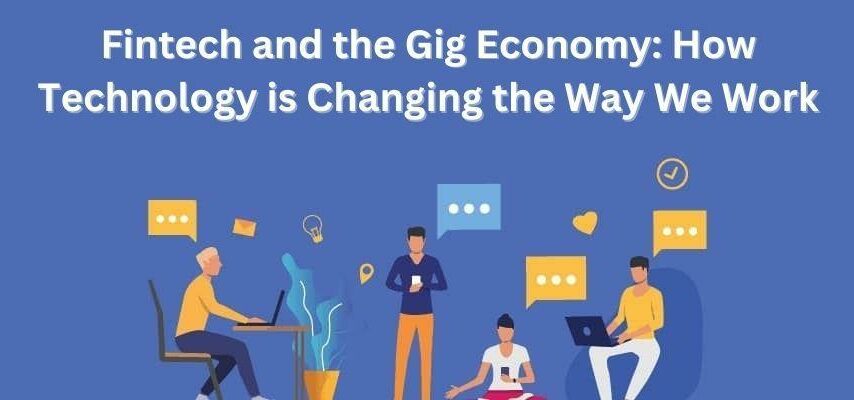Fintech, or financial technology, is having a major impact on the gig economy, which is made up of independent workers who typically work on a project-by-project basis. With the rise of platforms like Uber, Airbnb, and TaskRabbit, more and more people are earning money through gig work, and fintech is making it easier for them to manage their finances.
The gig economy, also known as the sharing economy or on-demand economy, refers to the growing trend of individuals using technology to work independently or for short-term projects, rather than in traditional full-time jobs.
Fintech, or financial technology, encompasses a wide range of technological innovations that are disrupting traditional financial services and creating new opportunities for consumers and businesses.
One way that fintech is impacting the gig economy is through the creation of new payment and banking options for gig workers. Traditional banks and payment systems are often not designed to meet the needs of gig workers, who may have inconsistent income and a lack of access to traditional financial services.
Fintech companies, such as Square, Stripe, and PayPal, have stepped in to provide gig workers with easy and reliable ways to receive payments and manage their finances.
Fintech is also playing a role in facilitating access to credit for gig workers, who may not have the same credit history or assets as traditional employees. Online lending platforms, such as Lending Club and Prosper, use alternative data and algorithms to assess creditworthiness and offer loans to gig workers who may not be able to access traditional forms of credit.
Another way that fintech is impacting the gig economy is through the use of blockchain technology to create decentralized platforms for gig work. Blockchain allows for the creation of trustless networks, where transactions can be recorded and tracked without the need for intermediaries.
This can enable gig workers to connect directly with clients and be paid in a decentralized cryptocurrency, rather than through a centralized platform.
Overall, fintech is playing a significant role in transforming the gig economy and empowering gig workers with new financial tools and opportunities. As technology continues to evolve, we can expect to see even more innovation in the fintech and gig economy space in the future.
One way fintech is impacting gig workers is through the development of new payment systems. Traditional payment methods, such as checks and bank transfers, can be slow and cumbersome, but fintech companies are creating faster, more efficient ways to pay gig workers.
For example, platforms like Stripe and PayPal allow gig workers to receive payments quickly and easily, and apps like Venmo and Square Cash make it easy for gig workers to transfer money to others.
Another way fintech is impacting gig workers is by providing new financial products and services. For example, many gig workers don’t have access to traditional benefits like health insurance and retirement savings plans, but fintech companies are creating new products to fill this gap.
For example, some companies are offering gig workers access to low-cost health insurance and 401(k) plans.
Digital fintech solutions are technology-based platforms or applications that aim to make financial services more efficient and accessible to consumers. Some examples of digital fintech solutions include:
- Mobile banking apps: These allow customers to manage their bank accounts and make transactions using their smartphones.
- Online lending platforms: These connect borrowers with lenders, allowing for faster and more streamlined loan applications.
- Digital wallets: These enable customers to store and use digital versions of their credit and debit cards.
- Investment apps: These allow customers to manage their investments and portfolios on their mobile devices.
- Blockchain-based platforms: These use blockchain technology to facilitate secure and transparent financial transactions.
The use of digital fintech solutions is growing rapidly, as more and more consumers turn to digital channels for their financial needs. There are several types of digital fintech software available in the market to help the users.
This trend is driven by factors such as convenience, security, and the ability to access a wide range of services from a single platform. Digital fintech solutions also have the potential to increase financial inclusion by making financial services more accessible to underbanked populations.
Fintech is also helping gig workers to manage their money more effectively. With the rise of apps like Mint and PocketGuard, gig workers can easily track their income and expenses, and create budgets to help them save money.
Fintech solution providers have been leveraging the latest tools and technologies to deliver the best services to their clients. Fintech Software Development is a booming industry that would notice an exponential growth in the coming years.
Another way that technology is impacting the gig economy is through the use of automation and artificial intelligence (AI). While these technologies have the potential to displace some gig workers, they are also creating new opportunities for gig workers who have the skills to work with these technologies.
For example, gig workers who are proficient in programming, data analysis, and other technical skills are in high demand, as they are needed to build, operate, and maintain the platforms and systems that are driving the gig economy.
Technology is also changing the way that gig workers are paid and compensated. Many gig economy platforms now use digital payment methods, such as digital wallets and mobile payments, which make it easier for gig workers to receive payments quickly and securely. Additionally, the use of blockchain technology, which creates a secure and transparent record of transactions, is being explored as a way to ensure that gig workers are paid fairly and on time.
Artificial Intelligence (AI)
AI (artificial intelligence) has the potential to impact the gig economy in several ways. It can automate certain tasks that are currently performed by gig workers, reducing the demand for human labor. On the other hand, AI can also create new opportunities for gig workers by enabling them to perform tasks that were previously too complex or time-consuming for humans to handle.
Additionally, AI can also be used to enhance the gig worker experience by providing them with real-time information and tools to improve their productivity and earning potential. Overall, the impact of AI on the gig economy is likely to be complex, with both positive and negative effects.
AI can also be used to enhance the safety and security of gig workers, for example, by providing them with real-time information about potential safety hazards or by monitoring their movements to ensure their safety.
However, it’s important to note that AI has the potential to displace many gig workers and lead to increased income inequality if the benefits of automation are not shared equitably. Moreover, AI-based platforms can also increase competition among gig workers, which can lead to lower wages and fewer benefits.
Overall, it’s important to consider the potential impact of AI on the gig economy and to develop policies that support gig workers and ensure that the benefits of automation are shared equitably.
Internet of Things (IoT)
The Internet of Things (IoT) refers to the interconnectedness of physical devices, vehicles, buildings, and other items embedded with sensors, software, and network connectivity that enable these objects to collect and exchange data.
In the gig economy, individuals engage in short-term or freelance work as opposed to traditional long-term employment. IoT technology can play a role in the gig economy by enabling gig workers to access new job opportunities and streamline their work through the use of smart devices and automation.
For example, gig workers in the transportation industry can use IoT-enabled vehicles to optimize routes and increase efficiency, while gig workers in the service industry can use IoT-enabled tools to manage appointments and communicate with clients.
5G
5G is the fifth generation of mobile networks, which offers faster speeds and more reliable connections than previous generations. It has the potential to enable new technologies and services, such as the Internet of Things (IoT) and autonomous vehicles.
The gig economy refers to the growing trend of people working as freelancers, independent contractors, or part-time workers, often through online platforms such as Uber or TaskRabbit. This type of work arrangement allows for flexibility and autonomy, but it can also lead to insecurity and lack of benefits.
5G technology can help to support the gig economy by providing faster and more reliable connections, which can make it easier for gig workers to find and complete jobs, and for companies to manage their gig workforce.
In conclusion, technology is having a profound impact on the gig economy, creating new opportunities for gig workers while also raising questions about the future of work and the role of technology in the economy.
As technology continues to evolve, it will be important to consider how it can be used to create a more inclusive and equitable gig economy for workers and customers alike.
There is no doubt that fintech is changing the way gig economy workers manage their finances and the way they work. This is the right time for building fintech solutions to make your business grow. With the help of fintech app development, gig workers have more options to manage and grow their finances, and it makes the process of receiving payments and other financial transactions more convenient and efficient. As the gig economy continues to grow, it’s likely that fintech will continue to play an important role in supporting gig workers and helping them to succeed.








